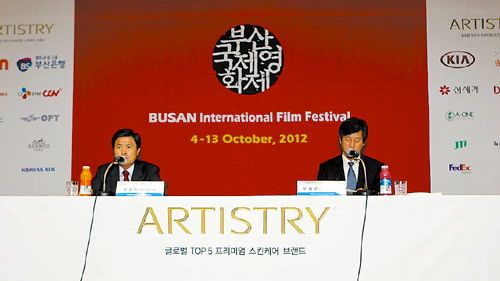SUMMARY
This is AI generated summarization, which may have errors. For context, always refer to the full article.

BUSAN, South Korea – A low-budget, experimental production from Thailand and a gripping Lebanese drama shared the main award at Asia’s largest film festival, which draws to a close on Saturday, October 13.
Jurors for the New Currents award at the Busan International Film Festival described first-time Thai director Nawapol Thamrongrattanarit’s “36” as “breathtaking” while praising the “extraordinary sympathy” director Maryam Najafi was able to draw from her audience throughout her entry “Kayan.”
Both productions receive $30,000 for the award, which offers two first prizes and is open to first- or second-time Asian filmmakers.
Nawapol’s film – made for just $20,000 – is set around 36 static images and tells the story of a young woman struggling to relate to her own memories.
“The first time I screened this film it was in a conference room for about 20 people so I was honored to be invited to Busan,” said Nawapol.
“My story’s about how many different ways there are to look at the way we live our lives.”
The New Currents jury, headed by the veteran Hungarian director Bela Tarr, celebrated Nawapol’s work for creating his “own film language.”
“The jury found especially that the writing was breathtaking, artful, economic, and never included an unnecessary word,” they said in a statement.
Praise came also for first-time director Najafi’s sympathetic portrayal of a Lebanese woman trying to juggle the twin demands of business and family in a foreign country and for the filmmaker’s ability “to go from emotion to analysis in the acute portrait of a woman fighting to keep a new life going.”
“We did everything you are not supposed to do with this film – from using child actors to borrowing sets – but we persevered,” said Najafi.
The 10-day BIFF closes Saturday with the official awards presentation and the world premiere of Bangladeshi filmmaker Mostofa Sarwar Farooki’s comedy-drama “Television,” which focuses on a clash of generations in a rural village.
Festival organizers said more than 220,000 people had attended this year’s 17th edition, a record for the event.
While film fans were treated to 304 films from 75 countries – with 93 world premieres – much of the talk surrounding the festival was about how strong the local representation was this year.
The world premiere of the Chung Ji-Young-directed “National Security,” which offers a harrowing look at state-sponsored torture in the 1980s, brought universal praise from festival-goers and film critics.
The director said he had deliberately set the release of the film to come before December’s presidential elections in South Korea.
Park Geun-Hye, the daughter of South Korea’s former military leader General Park Chung-Hee, who was blamed for implementing government-backed torture during his reign in the 1960s and 1970s, is running in the election.
The world premiere of another local production also grabbed festival-goers’ attention. Independent director O Muel’s low budget, black-and-white action-drama “Jiseul” is set in the late 1940s on the island of Jeju.
It tells the story of a group of islanders who try to hold out in a cave against government forces and the production picked up the NETPAC award for the promotion of Asian cinema and also an award handed out by the festival’s team of citizen reviewers.
The festival also featured the rare screening of a film from North Korea, with two sold-out sessions greeting the romantic comedy “Comrade Kim Goes Flying.” – Agence France-Presse
Add a comment
How does this make you feel?
There are no comments yet. Add your comment to start the conversation.